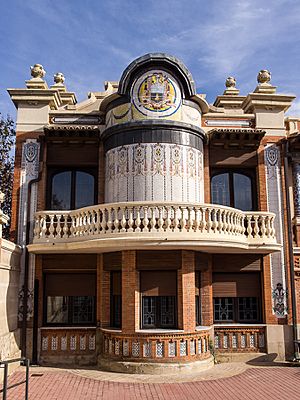Solans House facts for kids
Quick facts for kids Solans House |
|
|---|---|
| Native name Spanish: Casa Solans |
|
 |
|
| Location | Saragossa, Spain |
| Architect | Miguel Ángel Navarro Pérez |
| Official name: Casa Solans, Casa de los Azulejos | |
| Criteria | Monument |
The Solans House (in Spanish, Casa Solans) is a beautiful old building in Saragossa, Spain. It's also known as Casa de los Azulejos, which means "House of Tiles". This name comes from the many colorful tiles that decorate the building. It's a great example of a special building style called Art Nouveau.
Contents
What is Art Nouveau Style?
Art Nouveau is an art and design style that was popular around 1900. It uses lots of curvy lines and shapes inspired by nature, like plants and flowers. Think of flowing lines, fancy decorations, and often bright colors. Buildings in this style often look very artistic and unique.
History of Solans House
Building the House
The Solans House was built between 1918 and 1921. It was designed by a talented architect named Miguel Ángel Navarro Pérez. A rich businessman named Juan Solans asked him to build this amazing house. Juan Solans was an industrialist, meaning he owned factories or businesses that made things.
Changes Over Time
Juan Solans, the owner, passed away in 1926. After that, his wife and his nephew shared ownership of the house. For a long time, the building was empty and not used. It started to look a bit sad and worn out.
A New Purpose
Luckily, the Solans House was later fixed up and made new again. It then became an important office for the United Nations. Specifically, it was the headquarters for the United Nations Office of Support to the Water Decade until 2015. This office worked on projects to help people around the world get clean water.
Why is Solans House Special?
The Solans House is special because it's a great example of Art Nouveau architecture in Spain. Its unique design and beautiful tiles make it stand out. It shows how art and design were changing in the early 1900s. Today, it's a protected monument, which means it's an important historical building that people want to keep safe for the future.
See also
 In Spanish: Casa Solans para niños
In Spanish: Casa Solans para niños

